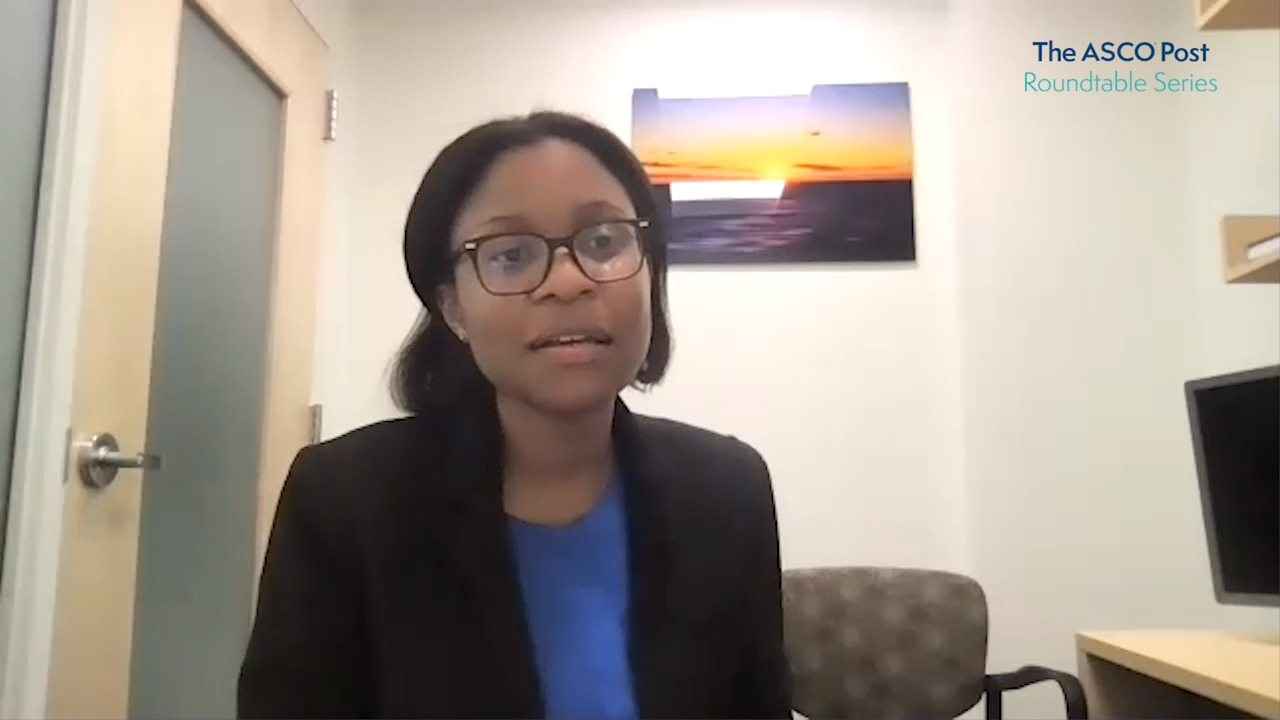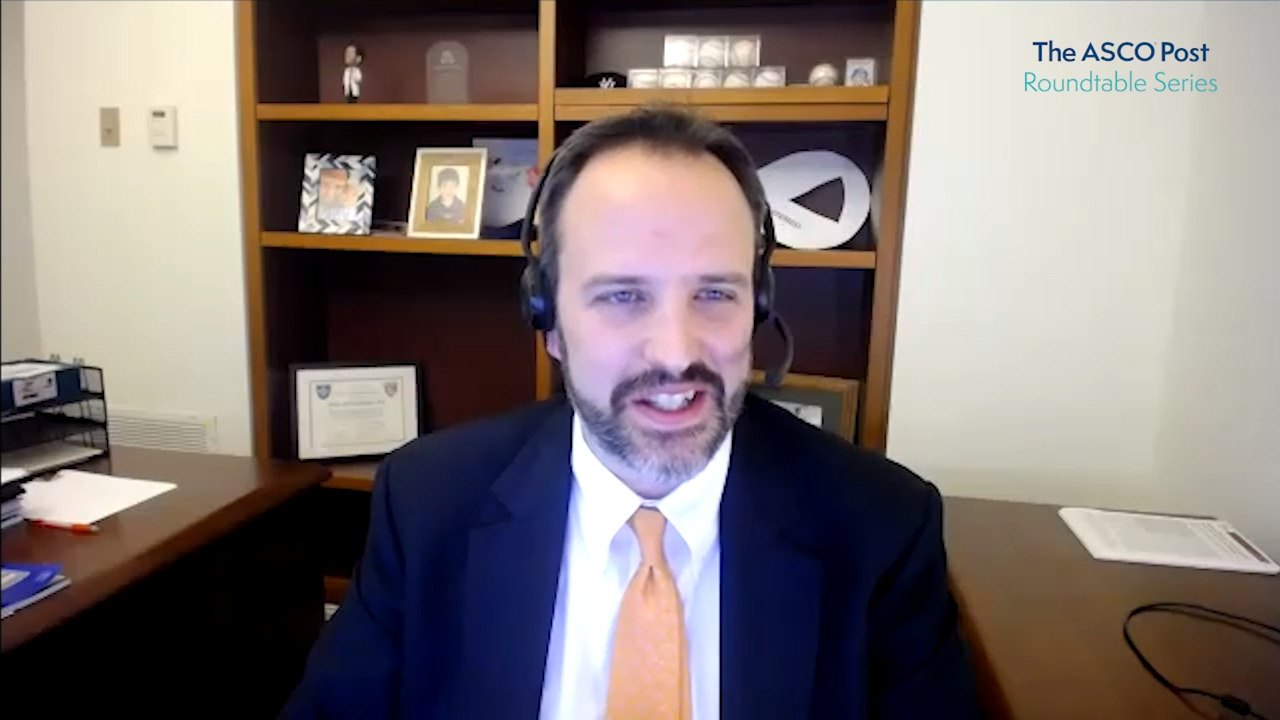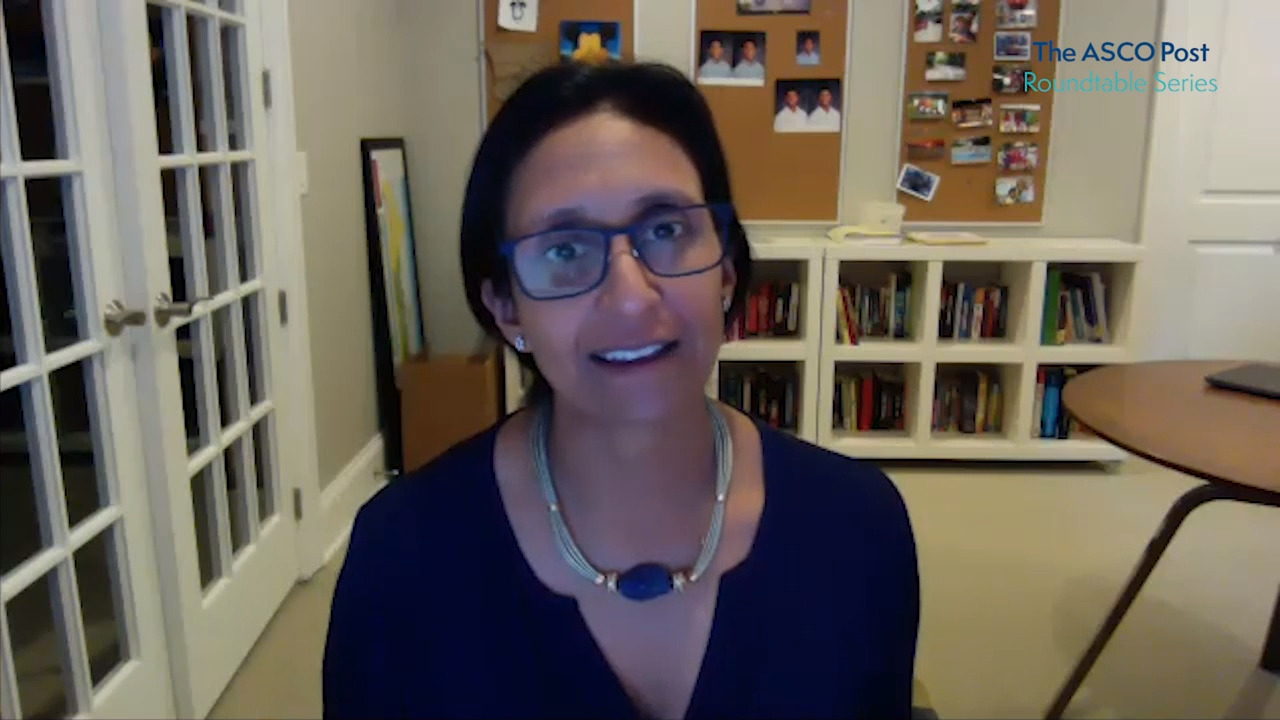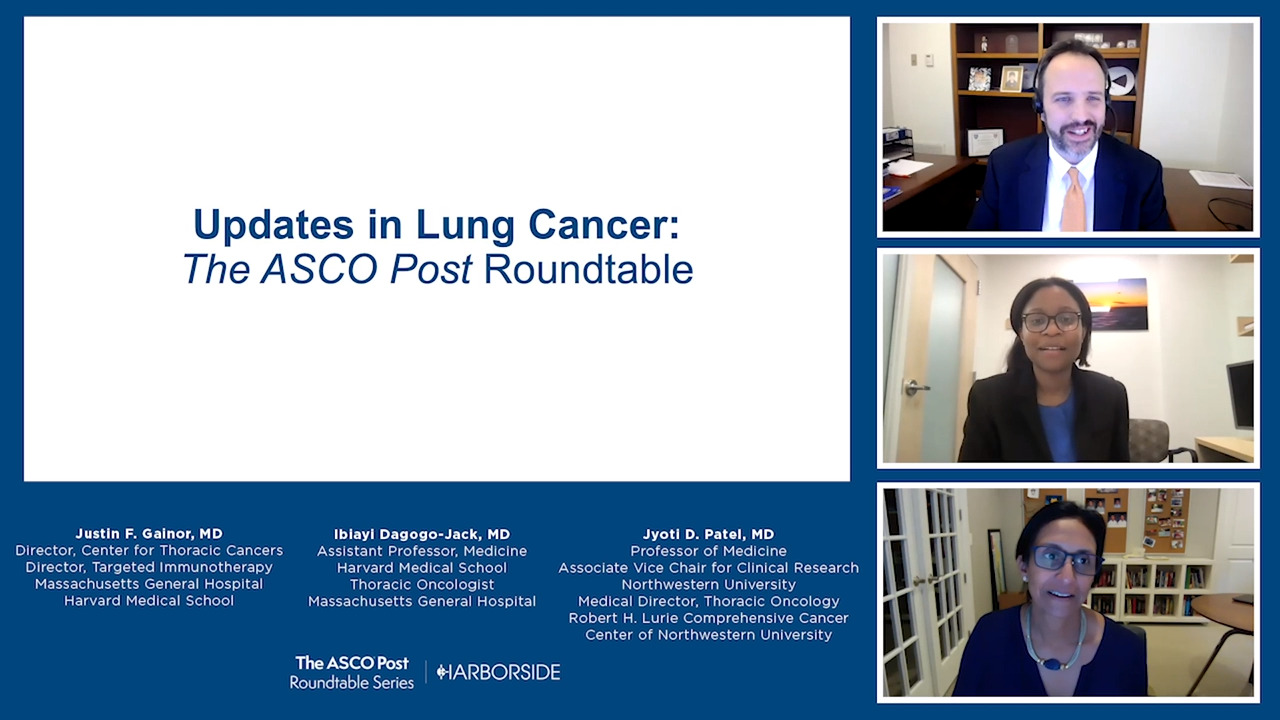POSEIDON Trial: Dual Checkpoint Blockade Plus Chemotherapy Improves Survival in First-Line Metastatic NSCLC
Findings from the phase III POSEIDON trial showed significantly improved progression-free and overall survival in patients with metastatic non–small cell lung cancer (NSCLC) who received first-line durvalumab and tremelimumab plus chemotherapy vs chemotherapy alone. These findings were presented by ...
IMpower010 Study of Atezolizumab in Resectable NSCLC: Benefits Observed Regardless of Stage, Type of Prior Treatment
In an exploratory analysis of the pivotal phase III IMpower010 trial—which found that adjuvant atezolizumab significantly improved disease-free survival in resectable non–small cell lung cancer (NSCLC)—benefit was shown regardless of the type of surgery or the chemotherapy doublet received by the...
No Overall Survival Benefit With Lurbinectedin/Doxorubicin in Small Cell Lung Cancer
As a second-line treatment for patients with small cell lung cancer (SCLC), lurbinectedin plus doxorubicin failed to improve overall survival in the multicenter ATLANTIS trial, but it did provide other benefits, Luis Paz-Ares, MD, PhD, and colleagues reported at the International Association for...
Christine D. Berg, MD, on Lung Cancer Deaths Attributable to Air Pollution: Global Variability
Christine D. Berg, MD, of the National Cancer Institute, discusses air pollution as a carcinogen that disproportionately affects poorer, overburdened communities and the elderly and frail—especially in countries where smoking rates are high and the use of coal predominates. Clinicians, Dr. Berg says, can help their patients by advocating for switching to clean energy and transportation and helping health-care facilities become more sustainable (Abstract PL02.07).
Amivantamab-vmjw for Previously Treated Advanced NSCLC With EGFR Mutation
On May 21, 2021, amivantamab-vmjw, a bispecific antibody directed against EGFR and MET receptors, was granted accelerated approval for treatment of adults with locally advanced or metastatic non–small cell lung cancer (NSCLC) with EGFR exon 20 insertion mutations, as detected by a U.S. Food and...
Alex A. Adjei, MD, PhD, on Disparities in Lung Cancer Care: The Global Burden
Alex A. Adjei, MD, PhD, of the Mayo Clinic, talks about the fact that despite strides in lung cancer treatment, more than 60% of the world’s patients with the disease are in countries with relatively scarce medical resources, where less than 50% of patients are screened. There is a great need, says Dr. Adjei, to focus on ways to reduce disparities and remove the barriers of cost, access, quality, and lack of awareness (Abstract PL01.03).
Matthew Smeltzer, PhD, on International Lung Cancer Clinical Trials: The Impact of COVID-19
Matthew Smeltzer, PhD, of the University of Memphis, discusses a study of 171 trials in 45 countries that saw reduced enrollment as a result of the COVID-19 pandemic. Among the recommended steps to remove barriers and improve participation are more flexibility in allowing telehealth visits with researchers as well as clinicians, local lab testing and scans, altering trial schedules, and mailing experimental agents to patients whenever possible (Abstract PL02.09).
IASLC 2021: Single-Center Study Examines Psychological Impact of the COVID-19 Pandemic on Patients With Lung Cancer
Patients coping with lung cancer treated at one hospital in Mexico reported high levels of anxiety and saw their treatment delayed due to the COVID-19 pandemic, according to a study presented by Oscar Arrieta, MD, at the 2021 International Association for the Study of Lung Cancer (IASLC) World...
IASLC 2021: Enrollment in Clinical Trials for Lung Cancer Declined Significantly During the COVID-19 Pandemic
Enrollment in lung cancer clinical trials declined by 43% during the COVID-19 pandemic, according to research presented by Smeltzer et al at the International Association for the Study of Lung Cancer (IASLC) 2021 World Conference on Lung Cancer (Abstract PL02.09). IASLC Survey To assess the impact...
IASLC 2021: Study Examines Global Risk of Lung Cancer Due to Air Pollution
Five European countries rank highest for lung cancer risk attributable to air pollution among those aged 50 to 69 years, according to research presented by Berg et al in the Presidential Symposium Plenary Session at the International Association for the Study of Lung Cancer (IASLC) 2021 World...
Genomic Analysis of Lung Cancer in Never-Smokers
A genomic analysis of lung cancer in people with no history of smoking has found that a majority of these tumors arise from the accumulation of mutations caused by natural processes in the body. This study was conducted by an international team led by researchers at the National Cancer Institute...
Several Studies Show Rovalpituzumab Tesirine Is Ineffective Against SCLC
Four independent studies published in the Journal of Thoracic Oncology demonstrate that rovalpituzumab tesirine (Rova-T), a first-in-class antibody-drug conjugate directed against delta-like protein 3 (DLL3), is not effective against small cell lung cancer (SCLC). An accompanying editorial by...
Ensartinib Shows Superior Efficacy to Crizotinib in Advanced ALK-Positive NSCLC: eXalt3 Trial
As reported in JAMA Oncology by Leora Horn, MD, MSc, FRCPC, and colleagues, the phase III eXalt3 trial has shown significantly prolonged progression-free survival with ensartinib vs crizotinib in patients with advanced, recurrent, or metastatic anaplastic lymphoma kinase (ALK)-positive non–small...
Study Highlights Gaps Between Lung Cancer Treatment Recommendations and Real-World Use of Durvalumab
A recent study published by Ronden et al in JTO Clinical and Research Reports highlights the gap between treatment guidelines and real-world care with the monoclonal antibody durvalumab for patients with non–small cell lung cancer. Researchers studied treatment decision-making by three Dutch...
First-Line Veliparib Plus Platinum-Based Chemotherapy in Current Smokers With Advanced Squamous Cell NSCLC
In a phase III trial reported in the Journal of Clinical Oncology, Suresh S. Ramalingam, MD, and colleagues found that the addition of the poly (ADP-ribose) polymerase inhibitor veliparib to platinum-based chemotherapy did not improve overall survival in current smokers with previously untreated...
High Prevalence of Previously Undiagnosed Emphysema Among Individuals Undergoing Low-Dose CT Screening for Lung Cancer
In a prospective cohort study reported in Clinical Imaging, David Steiger, MD, of the Division of Pulmonary, Critical Care and Sleep Medicine, Icahn School of Medicine at Mount Sinai, in New York, and colleagues in the International Early Lung Cancer Action Program (I-ELCAP) identified emphysema in ...
Low-Dose CT Screening for Lung Cancer and the Incidental Findings That May Improve Future Health
Every interaction with patients is an opportunity to change the course of their lives. In the context of screening for disease, every encounter is an opportunity to detect the precursors or early changes that signal early pathophysiology. Smoking status and age are the factors that currently...
PD-L1–Positive Non–Small Cell Lung Cancer
In this video, Drs. Justin F. Gainor, Ibiayi Dagogo-Jack, and Jyoti D. Patel discuss current therapy options for PD-L1–positive non–small cell lung cancer (NSCLC). Dr. Gainor presents the case of a 65-year-old man with 55-year smoking history who was diagnosed with stage II NSCLC. The faculty discuss the importance of molecular testing in patients such as this; molecular testing revealed a PD-L1 tumor proportion score of 25%. They then turn their attention to adjuvant treatment options in light of the recent IMpower010 trial, which found that adjuvant PD-1 pathway inhibition with atezolizumab led to improved disease-free survival among patients with PD-L1 ≥ 1% stage II–III NSCLC. Editor's Note: On October 15, 2021, the U.S. Food and Drug Administration approved atezolizumab for adjuvant treatment following resection and platinum-based chemotherapy in patients with stage II to IIIA NSCLC with PD-L1 expression on ≥ 1% of tumor cells, as determined by an FDA-approved test.
ALK-Positive Non–Small Cell Lung Cancer
In this video, Drs. Justin F. Gainor, Ibiayi Dagogo-Jack, and Jyoti D. Patel discuss current treatment options for ALK fusion–positive non–small cell lung cancer (NSCLC). Dr. Gainor presents the case of a 31-year-old patient with minimal tobacco exposure who was diagnosed with metastatic NSCLC. PD-L1 immunohistochemistry revealed a tumor proportion score of 90%, and an EML4-ALK fusion was found on targeted next-generation sequencing. The faculty discuss the importance of testing for oncogenic drivers even in the presence of high PD-L1 expression and review the different generations of ALK inhibitors and their distinguishing features. Finally, they discuss their decision-making processes as it relates to first-line therapy, emphasizing the importance of patient communication, understanding toxicity profiles and resistance, and long-term follow-up.
NTRK Fusion–Positive Non–Small Cell Lung Cancer
In this video, Drs. Justin F. Gainor, Ibiayi Dagogo-Jack, and Jyoti D. Patel discuss the management of NTRK fusion–positive non–small cell lung cancer (NSCLC). Dr. Gainor presents the case of a 44-year-old man with a 5 pack-year history of tobacco exposure who was diagnosed with metastatic NSCLC; molecular testing was initially negative, but subsequent targeted next-generation sequencing revealed an NTRK1 fusion, a key oncogenic driver. The faculty discuss when and where to order additional molecular testing or next-generation sequencing in patients such as this. They review recent clinical data surrounding two agents approved by the FDA for NTRK fusion–driven lung cancer, larotrectinib and entrectinib.
RET Fusion–Positive Non–Small Cell Lung Cancer
In this video, Drs. Justin F. Gainor, Ibiayi Dagogo-Jack, and Jyoti D. Patel discuss the management of RET fusion–positive non–small cell lung cancer (NSCLC). The case presented is a 65-year-old never-smoker patient with metastatic NSCLC who was found to have an EGFR A118V mutation and a KIF5B-RET fusion. The faculty provide background on RET fusions in lung cancer and discuss the different testing modalities used to identify RET alterations. In addition, they discuss how the treatment landscape for these patients has changed in recent years, reviewing data from the recent ARROW and LIBRETTO-001 trials.
Does Antibiotic Exposure Affect Response to First-Line Chemoimmunotherapy in Patients With NSCLC?
In an international, multicenter study, researchers evaluated the impact of prior and concurrent antibiotic exposure in a cohort of patients with advanced non–small cell lung cancer (NSCLC) treated with first-line chemoimmunotherapy combinations. In contrast to what has been reported in patients...
Does Sparing the Hippocampus During Prophylactic Cranial Irradiation for SCLC Help to Preserve Cognitive Function?
In the Spanish phase III PREMER trial reported in the Journal of Clinical Oncology, Rodríguez de Dios et al found that hippocampal avoidance during prophylactic cranial irradiation (PCI) for small cell lung cancer (SCLC) was associated with better preservation of cognitive function vs PCI alone and ...
Hypofractionated Image-Guided vs Conventional Radiotherapy in Patients With Stage II/III NSCLC Ineligible for Concurrent Chemoradiation
In a phase III trial reported in JAMA Oncology, Puneeth Iyengar, MD, PhD, and colleagues found that accelerated hypofractionated image-guided radiotherapy (IGRT) did not improve 1-year overall survival vs conventional radiotherapy in patients with stage II/III non–small cell lung cancer (NSCLC) who ...
FDA Pipeline: Reviews for Agents in Lung Cancer, Thyroid Cancer, Kidney Cancer, and More
Recently, the U.S. Food and Drug Administration (FDA) accepted applications for agents aiming to treat non–small cell lung cancer (NSCLC), differentiated thyroid cancer, renal cell carcinoma (RCC), hypersensitive acute lymphoblastic leukemia (ALL), mucosal melanoma, and endometrial carcinoma....
Amivantamab for Patients With EGFR Exon 20 Insertion–Mutated NSCLC After Disease Progression on Platinum Therapy
As reported in the Journal of Clinical Oncology by Keunchil Park, MD, PhD, and colleagues, amivantamab-vmjw given at the selected phase II dose in a phase I trial (CHRYSALIS) produced durable responses in patients with EGFR exon 20 insertion–mutated non–small cell lung cancer (NSCLC) whose disease...
Evaluation of Baseline Cancer Mortality Risk in Medicaid Expansion and Nonexpansion States
In a study of National Cancer Database data reported in a research letter in JAMA Oncology, Salazar et al found little difference in baseline cancer mortality rates between U.S. states that expanded Medicaid enrollment and nonexpansion states prior to expansion in 2009 and immediately following...
NRG-LU001 Trial: Addition of Metformin to Chemoradiation in Locally Advanced NSCLC
In the phase II NRG-LU001 trial reported in JAMA Oncology, Skinner et al found that the addition of metformin to concurrent chemoradiation did not improve progression-free survival or overall survival at 1 year in patients with unresectable stage III non–small cell lung cancer (NSCLC). Study...
Lung Cancer Screening Rates Improved in 19 States Despite the COVID-19 Pandemic
A new population-based study showed that although national lung cancer screening rates decreased in some states, 19 states actually experienced significant improvements in screening rates despite the COVID-19 pandemic. Overall lung cancer screening rates remained low and unchanged, according to...
Addition of Metformin to Chemoradiotherapy for Locally Advanced NSCLC
As reported in JAMA Oncology by Tsakiridis et al, the Canadian phase II OCOG-ALMERA trial, which was closed early due to slow accrual, showed that the addition of metformin to chemoradiation therapy was associated with worse outcomes in patients with unresected locally advanced non–small cell lung ...
Lorlatinib for Metastatic ALK-Positive NSCLC
On March 3, 2021, lorlatinib was granted regular approval for treatment of patients with metastatic non–small cell lung cancer (NSCLC) with ALK-positive tumors as detected by a U.S. Food and Drug Administration (FDA)-approved test.1,2 The FDA simultaneously approved the Ventana ALK (D5F3) CDx Assay ...
Addition of Ipilimumab to Nivolumab in Previously Treated, Immunotherapy-Naive Patients With Stage IV Squamous NSCLC
As reported in JAMA Oncology by Scott N. Gettinger, MD, and colleagues, the phase III Lung Cancer Master Protocol S1400I trial showed no improvement in overall survival with the addition of ipilimumab to nivolumab in previously treated, immune checkpoint inhibitor–naive patients with stage IV...
Study Identifies MET Amplification as a Driver for Some Non–Small Cell Lung Cancers
A study published by D. Ross Camidge, MD, PhD, and colleagues in the Journal of Thoracic Oncology has helped to define MET amplification as a rare but potentially actionable driver for non–small cell lung cancer (NSCLC). Dr. Camidge said many of the major developments in the treatment of NSCLC have ...
Adding Perioperative Durvalumab to Neoadjuvant Chemotherapy in Stage IIIA NSCLC
In a Swiss phase II trial (SAKK 16/14) reported in the Journal of Clinical Oncology, Rothschild et al found that the addition of perioperative durvalumab to neoadjuvant cisplatin/docetaxel resulted in a high major pathologic response rate and an event-free survival rate of 73% in patients with...
Consensus Statement From IASLC on Liquid Biopsy for Advanced NSCLC
As reported in the Journal of Thoracic Oncology by Christian Rolfo, MD, PhD, and colleagues, the International Association for the Study of Lung Cancer (IASLC) has issued a consensus statement on the use of liquid biopsy in advanced non–small cell lung cancer (NSCLC). Select recommendations are...
Does the Presence of Neuronal Autoantibodies Contribute to Cognitive Impairment in Patients With Lung Cancer?
In a German prospective cross-sectional study reported in JAMA Oncology, Bartels et al found that a high proportion of patients with lung cancer had neuronal antibodies that may be associated with increased risk of cognitive impairment. As stated by the investigators, “Paraneoplastic neurological...
Expert Point of View: Edward B. Garon, MD, MS
Invited discussant of the BOOSTER trial,1 Edward B. Garon, MD, MS, Professor of Medicine and Director of the Thoracic Oncology Program, David Geffen School of Medicine at the University of California Los Angeles, said the study’s research question is appropriate, since osimertinib was established...
Study Finds Bevacizumab Offers No Boost to Second-Line Osimertinib in EGFR T790M–Mutated Lung Cancer
For the second-line treatment of advanced EGFR T790M–mutated non–small cell lung cancer (NSCLC), the performance of osimertinib alone was not found to be different from that of osimertinib plus bevacizumab in the phase II ETOP 10-16 BOOSTER trial, reported at a European Society for Medical...
Expert Point of View: Nicolas Girard, MD, PhD
Invited discussant Nicolas Girard, MD, PhD, of the Curie Institute, Paris, said, “A major challenge in NSCLC is what happens when osimertinib resistance develops.” “A key takeaway point from this study is that the efficacy is driven by resistance mechanism. The overall response rate was 47% in the ...
Amivantamab/Lazertinib Combination May Overcome Osimertinib Resistance in Patients With EGFR-Positive NSCLC
Combination targeting of epidermal growth factor receptor (EGFR) with amivantamab/lazertinib achieved durable responses in more than one-third of chemotherapy-naive patients with EGFR-mutant non–small cell lung cancer (NSCLC) that had progressed on osimertinib, according to a cohort analysis of the ...
Mechanisms of Acquired Resistance to KRAS G12C Inhibition in Patients With Cancer
In a study reported in The New England Journal of Medicine, Awad et al identified potential mechanisms of acquired resistance to the KRAS G12C inhibitor adagrasib in patients receiving the agent for treatment of KRAS G12C–mutant cancers. As noted by the investigators, clinical trials of the KRAS...
Emerging Reasons for Optimism in Lung Cancer
Despite public smoking cessation initiatives and improved methods for early detection and treatment, lung cancer persists as the leading cause of cancer death in both men and women in the United States. However, over the past decade, smoking cessation efforts, increased screening, and new...
Sotorasib: Subgroup Analysis of Phase II Trial Shows Activity With Breakthrough KRAS Inhibitor in Lung Cancer
The breakthrough KRAS-specific inhibitor sotorasib achieved responses in patients with KRAS G12C–mutated non–small lung cancer (NSCLC) who had experienced disease progression on platinum-based chemotherapy, immunotherapy, or both treatments. The objective response rate was 37.1%, and responses...
Martin Reck, MD, PhD, on NSCLC: Nivolumab, Ipilimumab, and Chemotherapy for Advanced Disease
Martin Reck, MD, PhD, of LungenClinic, discusses a 2-year update of the CheckMate 9LA study, which sought to determine whether nivolumab plus ipilimumab combined with two cycles of chemotherapy is more effective than four cycles of chemotherapy alone as a first-line treatment for patients with stage IV non–small cell lung cancer (Abstract 9000).
Study Evaluates Residential Racial Segregation and NSCLC Treatment and Outcomes
Non–small cell lung cancer (NSCLC) accounts for 80% to 85% of cases of lung cancer; when it is diagnosed early, there is a 5-year survival rate of 50% to 80%. Black patients have a lower overall incidence of NSCLC than White patients but are more likely to be diagnosed at later stages. They also...
Trilaciclib to Reduce Chemotherapy-Induced Bone Marrow Suppression in Extensive-Stage Small Cell Lung Cancer
On February 12, 2021, the cyclin-dependent kinase 4/6 (CDK4/6) inhibitor trilaciclib was approved for use to decrease the incidence of chemotherapy-induced myelosuppression in adult patients when administered prior to a platinum/etoposide–containing regimen or topotecan-containing regimen for...
Pralsetinib in Advanced RET Fusion–Positive NSCLC: ARROW Trial
As reported in The Lancet Oncology by Justin F. Gainor, MD, and colleagues, an interim analysis of the phase I/II ARROW trial has shown that the oral RET inhibitor pralsetinib produced high response rates in previously treated and treatment-naive patients with advanced RET fusion–positive non–small ...
Real-World Survival Outcomes With Targeted Therapy for Intracranial Metastatic Disease
In a retrospective cohort study reported in JAMA Oncology, Erickson et al found that real-world use of targeted therapy after diagnosis of intracranial metastatic disease was associated with improved overall survival vs no use of targeted therapy in patients with HER2-positive breast cancer,...
Global Registry Analysis of NRG1 Fusion–Positive Lung Cancer
In an analysis from the global eNRGy1 registry for NRG1 fusion–positive lung cancers reported in the Journal of Clinical Oncology, Alexander Drilon, MD, and colleagues found greater than expected heterogeneity in characteristics of disease. Additionally, patients had poor responses to cytotoxic,...
Dual Immune Checkpoint Blockade With Nivolumab and Ipilimumab for Treatment of Malignant Pleural Mesothelioma
In recent years, immune checkpoint inhibitors in the treatment of mesothelioma have been a keen area of investigation for this immunogenic solid tumor. With recent publications, principally findings from CheckMate 743 by Baas et al1 (reviewed in this issue of The ASCO Post), combination immune...








